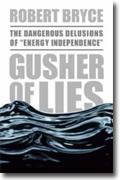Gusher of Lies
Robert Bryce
book reviews:
· general fiction
· chick lit/romance
· sci-fi/fantasy
· graphic novels
· nonfiction
· audio books
· author interviews
· children's books @
curledupkids.com
· DVD reviews @
curledupdvd.com
newsletter
win books
buy online
links
home
for authors
& publishers
for reviewers

 |
Gusher of Lies: The Dangerous Delusions of Energy Independence Robert Bryce PublicAffairs Hardcover 384 pages March 2008 |
|
Robert Bryce has written an important book, one in which he persuasively argues that America’s goal of achieving “energy independence” is not just unwise; it is impossible. Gusher of Lies
Bryce is particularly scornful of the ethanol scam that is making some farmers, and at least one major agribusiness, Archer Daniels Midland, wealthy at the expense of the rest of us because he believes that biofuels are more expensive and more destructive than the fossil fuels they replace. The government continues to subsidize those producing ethanol with billions of taxpayer dollars despite the damning evidence that ethanol is a huge drain on the U.S. economy, increasing not just the cost of a tank of “gasoline” but the many food products impacted by an unnecessary competition for the country’s limited corn crop. Equally disturbing is the fact that ethanol production probably makes global warming, if it in fact exists, worse instead of better because the production cycle of ethanol, from raising the corn crop to creating the finished product, results in carbon dioxide emissions that are 50 percent greater than those produced by simply using fossil fuels. As bad as these facts are, perhaps the most appalling side effect of producing large corn crops for ethanol purposes is that a vast amount of water, another limited resource, is being squandered to raise those crops. Bryce estimates that, on average, 132 gallons of water are required to produce each gallon of ethanol. Compare this to the less than three gallons of water needed to produce a gallon of gasoline. And all this water creates a product that, per gallon, produces only two-thirds the energy of the equivalent volume of gasoline. Bryce offers another fun fact for those still unconvinced that ethanol is a fool’s solution to America’s energy problems. He quotes a Washington Post article to the effect that, “the amount of grain needed to fill a 25-gallon SUV tank ‘would feed one person for a full year.’” Can anyone seriously suggest that this is a moral trade-off? Gusher of Lies I only wish that every member of Congress would carefully read this book. As it is now, Bryce believes that we are tilting at windmills, very expensive windmills, and I think that he is correct. Originally published on Curled Up With A Good Book at www.curledup.com. © Sam Sattler, 2008 |
|
|
|
 Click here to learn more about this month's sponsor! |
|
| fiction · sf/f · comic books · nonfiction · audio newsletter · free book contest · buy books online review index · links · · authors & publishers reviewers |
|
| site by ELBO Computing Resources, Inc. | |
 Simply put, at present there is no alternative fuel, or combination of fuels, capable of replacing the fossil fuels on which the country now depends for its energy needs. That will probably not change during the next three to five decades. Oil production in the U.S. reached peak levels in the early 1970s and will never again come close to reaching levels that would make this country energy independent, even when combined with a more substantial use of alternative fuels. To make matters worse, despite what environmentalists and others (usually those ready to make a personal profit from the alternative fuel) claim, all of the alternatives to oil share some combination of characteristics that make them poor substitutes: high cost, inadequate supply, lower energy efficiency, high carbon dioxide emission levels, diversion of food crops or consumption of vast volumes of water.
Simply put, at present there is no alternative fuel, or combination of fuels, capable of replacing the fossil fuels on which the country now depends for its energy needs. That will probably not change during the next three to five decades. Oil production in the U.S. reached peak levels in the early 1970s and will never again come close to reaching levels that would make this country energy independent, even when combined with a more substantial use of alternative fuels. To make matters worse, despite what environmentalists and others (usually those ready to make a personal profit from the alternative fuel) claim, all of the alternatives to oil share some combination of characteristics that make them poor substitutes: high cost, inadequate supply, lower energy efficiency, high carbon dioxide emission levels, diversion of food crops or consumption of vast volumes of water.